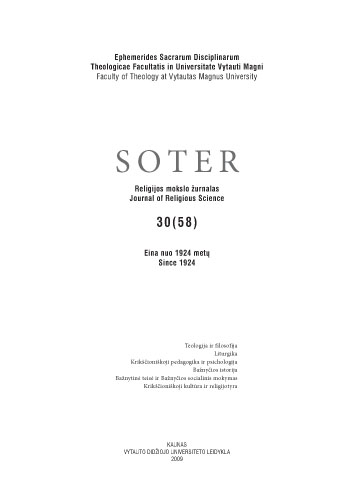Kalba kaip požiūris į pasaulį A. Maceinos filosofijoje
LANGUAGE AS WORLD-VIEW IN A. MACEINA’S PHILOSOPHY
Author(s): Jelena SimonovaSubject(s): Christian Theology and Religion
Published by: Vytauto Didžiojo Universitetas
Keywords: kalba; pasaulis; patirtis; prasmė; požiūris į pasaulį; interpretacija; language; the world; experience; meaning; world-view; interpretation
Summary/Abstract: It is necessary to begin from the point that human existence always supposes relationship with the world where language appears the only way to be therein. However, primarily human being is not well provided. Moreover, he does not possess his world so immediately and clearly, as the animals possess their own location in the wild. Hence, language is the first human s step to this location, to his own world which discloses itself only in the utterance. Language allows us to nuance all our impressions and designate each of them by a particular name. It originates an ordered and a structural whole of human habitation by naming the world's creatures, things, phenomena, as well as plenty of features and aspects. Entities of the world are essentially constituted by language in human reality. Besides, every word and every utterance always reveals a particular view as well as interpretation of a certain entity. Only that world which has a name discloses itself as an ordered whole which, on the other hand, always covers something that is not said. It is the main principle of Aoyoc in a pure sense. It shows us the expansion of human world until the boundaries that are defined by language. In the article, the language as world-view is investigated according to the language researches of A. Maceina, M. Heidegger, W. von Humboldt and other authors' reflections concerning language. The investigation of language that is presented in the article allows us to arrive at these conclusions: The analysis of similarities between interjection and word as well as their differences has shown that interjection as well as word belongs to the plane of subjectivity. In contrast, the word always strives to transcend the plane of subjectivity by making a motion towards externality. Thus, the word belongs to the domain of subjectivity and simultaneously reaches the world where it realizes itself in a concrete sense. Interjections are the merest emotional reactions which carry instinctive cries: they have instinctive origin. Hereby, the word is ambivalent. It includes both: the interjection and the sense. In consideration on language and its links with the thinking, it is necessary to infer that the word stands at the beginning of thinking. Every process of thinking begins with naming of an object. Hence, human thinking is not wordless or empty, on the contrary, it is always lingual. Every language represents the world-view of the nation which uses it. On the one hand, the naming of a particular thing always represents a nation's view on this thing. However, this naming cannot include all possible features of this thing. It reveals only one visual angle, and it accentuates only one experienced nuance of the thing that arises from this perspective. Accordingly, this thing is named by a particular word. Similarly, all other possibilities of viewing are not eliminated; they are simply concealed. The variety of visual angles of the same things and the distinctions between them c
Journal: SOTER: religijos mokslo žurnalas
- Issue Year: 58/2009
- Issue No: 30
- Page Range: 37-48
- Page Count: 12
- Language: Lithuanian

